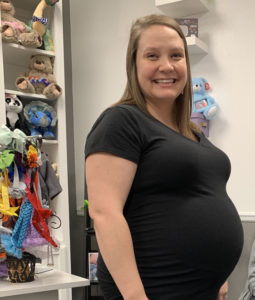Expecting, newborn moms can reach out for help as COVID-19, self-isolation increase stress and anxiety
By Diane Smith
Patrice Buffkin’s early worries about COVID-19 were work related.
Buffkin, an event-planning manager for The University of North Texas Health Science Center at Fort Worth, wondered if the disease would delay promotional items en route from China in January.
Buffkin was 29 to 32 weeks pregnant, expecting a baby girl. Her attention to COVID-19 intensified as the disease moved closer to home.
“I didn’t have any concerns about COVID-19 until my 39th week as more and more confirmed cases were being shared, and I realized it would be ‘blowing up’ as we awaited her arrival,” Buffkin said. “I had been calm about her delivery until then. Each day after that point, I was anxiously oscillating between wanting her to arrive early to avoid possible exposure in the hospital, to wanting her to stay past term so she would be safe in utero.”
As communities fight COVID-19, experts are keeping an eye on expectant and new mothers. These moms need to follow pandemic safety guidelines, including washing hands and social distancing, but they also need to pay attention to diet and their mental health, experts said.
“There are a lot of unknowns,” said Dr. Amy Raines-Milenkov, Assistant Professor and a member of HSC’s For Her Health Institute. “We have to social distance, but social isolation is what I am concerned about.”
At 1:46 a.m. on March 22, as communities experienced increasing alarm about COVID-19, Buffkin delivered Katherine Amelia.
While sheltering at home with a newborn, Buffkin is staying optimistic.
“There will be a point in the future when we get back to our new normal after COVID-19,” she said.
‘What happens if I get COVID-19?’

Elise Lokkesmoe’s baby boy is expected on April 28, and the weeks leading up to his birth have been consumed by COVID-19 worries.
“There is a slight fear of contracting the disease while in the hospital, but more of a fear for me is, what happens if I get COVID-19 before, during and after birth,” Lokkesmoe said. “What does that mean as a new mom? Will the baby and I be separated? Can I hold him? Would we go home? How would I care for a newborn and a toddler if my husband got sick?”
Lokkesmoe, a high school counselor, found comfort from family, friends and online support groups. She’s reflected on memories COVID-19 has tarnished – from friends’ cancelled baby showers to family visits at the hospital.
Lokkesmoe urged new moms to show themselves grace, love and compassion during an already emotional time. She said moms shouldn’t shy away from getting help.
“Things are changing daily,” Lokkesmoe said. “Things are tough. It all feels a little overwhelming some days. And yes, this experience is different than I might have chosen, but it is not lost on me for one minute how incredibly blessed I am to have the opportunity to bring this baby into the world.”
‘A protective bubble’
Expectant and new moms rely on family support, Dr. Raines-Milenkov said. But that safety net was weakened by COVID-19 because of stay-at-home emergency rules.
“You need so much support in that time period,” Dr. Raines-Milenkov said, adding that family and friends must keep checking via social media or phone.
Facebook and Zoom allow communities of moms to meet without getting exposed, she said. Moms can also go virtual to get breastfeeding and health tips. Counseling focused on postpartum depression is available by telephone or computer, Dr. Raines-Milenkov said.
News about the pandemic can be distressing, she said, adding that limiting the news and filtering social media creates “a protective bubble” that reduces stress and anxiety.
“Let someone else in the household read the news,” she said. “It can be very distressing.”
Eating right
Moms and infants need to eat well – even during this crisis, said Dr. Teresa Wagner, Assistant Professor and Clinical Executive of SaferCare Texas at HSC Fort Worth.
“It’s very important for them to follow safety precautions – especially since we are all using more leftovers right now,” Dr. Wagner said.
Families must follow food safety tips, wash hands, keep counters and dishes clean and keep raw meat apart from other food during preparation.
“Keep hot food hot, cold food cold,” Dr. Wagner said, adding that leftovers must be refrigerated quickly. She said expectant moms should avoid unpasteurized or raw milk and cheeses and juices; raw or undercooked animal foods, such as seafood, meat, poultry, eggs and raw sprouts.
Dr. Wagner said new and breastfeeding moms need to eat regular meals. Expectant moms also need to pay attention to diabetes and high blood pressure and ensure that canned foods aren’t loaded with sugar and sodium.
She said mothers should follow the MyPlate guidelines offered by the U.S. Department of Agriculture. But this might not be possible for mothers who struggle with food insecurity. She stressed: “These moms are at home – possibly cut off of whatever income they had.”
They can reach out to food banks and other community resources for help finding food or formula.
Help for moms
Catherine Carlton, chief of staff for My Health My Resources (MHMR) of Tarrant County, said moms need to feel connected.
“It’s physically distancing while staying connected,” Carlton said. “We want any mom to reach out if they have any concerns about their baby.”
Carlton said HelpMeGrowNorthTexas.org is a continuing resource for families.
Several programs moved from face-to-face to virtual, including Family Connects in Arlington, which is connecting new mothers. Moms can also find early childhood intervention support for babies (0-3) with developmental disabilities.
Carlton said early childhood services (0-6) and group activities also transitioned online.
If anyone is in crisis or needs support, ICARE Call Center is available 24/7 by call or text at 817-335-3022.
Help for families during pandemic
Help Me Grow North Texas links families to early childhood resources, service providers, and child development information based on the families’ presented needs, such as childcare, nutritional supports, housing assistance, and developmental screenings.
“Being socially connected is needed now more than ever for our own mental health and the mental health of those around us, including our children,” said Laura Kender, Chief of Early Childhood Services at MHMR. “Help Me Grow is here to help answer your questions and connect you to community resources.”
Help Me Grow North Texas has three main functions for North Texas families: (1) connecting families to community resources based on their unique needs, simultaneously connecting providers with families who can benefit from their resources; (2) helping to address pregnancy, parenting, and child development questions; and (3) offering free developmental screenings for any child from birth to age 6.
Help Me Grow is unique in that its staff are committed to a warm hand-off, personally connecting each family with the community resources that best fit their presented needs, said Catherine Carlton, chief of staff for My Health My Resources (MHMR) of Tarrant County.
Families can reach Help Me Grow North Texas through a phone line, email and website. Behind the phone lines are Help Me Grow North Texas Navigators, who specialize in connecting pregnant women and families with young children under the age of 6 to community support to meet their unique needs.
To find out more:
844.NTX.KIDS (844-689-5437)
mailto:Info@HelpMeGrowNorthTexas.org







Social media